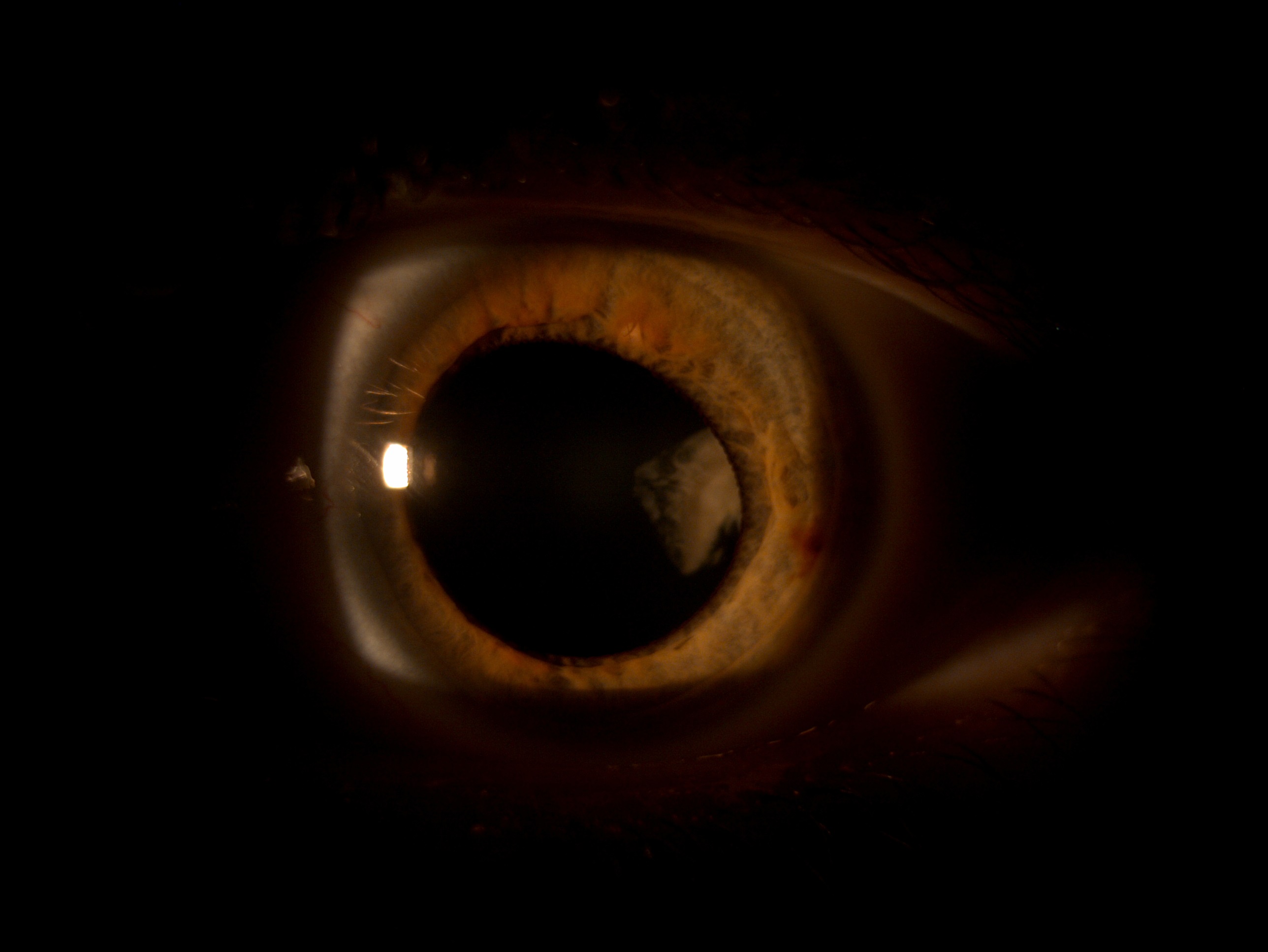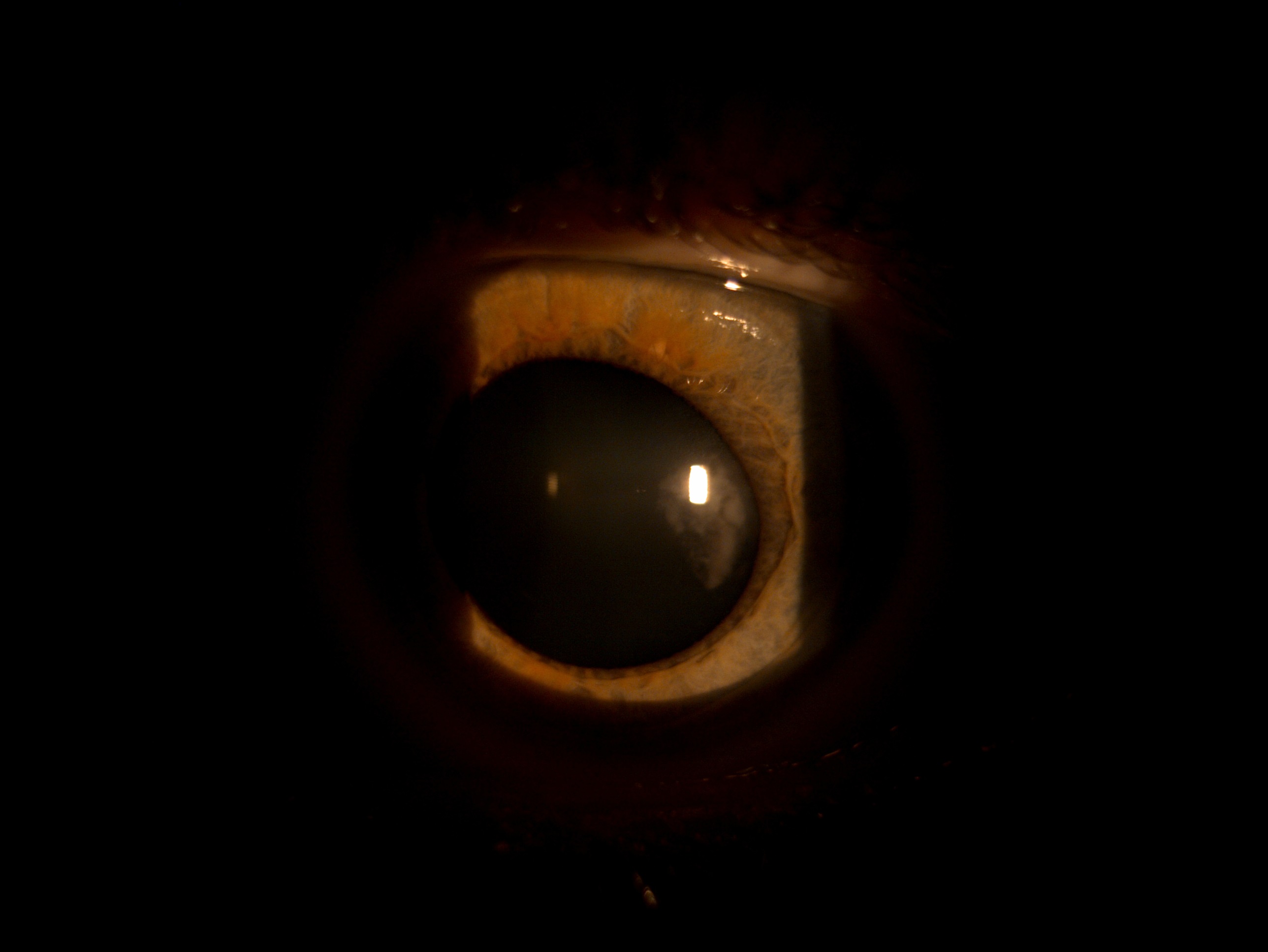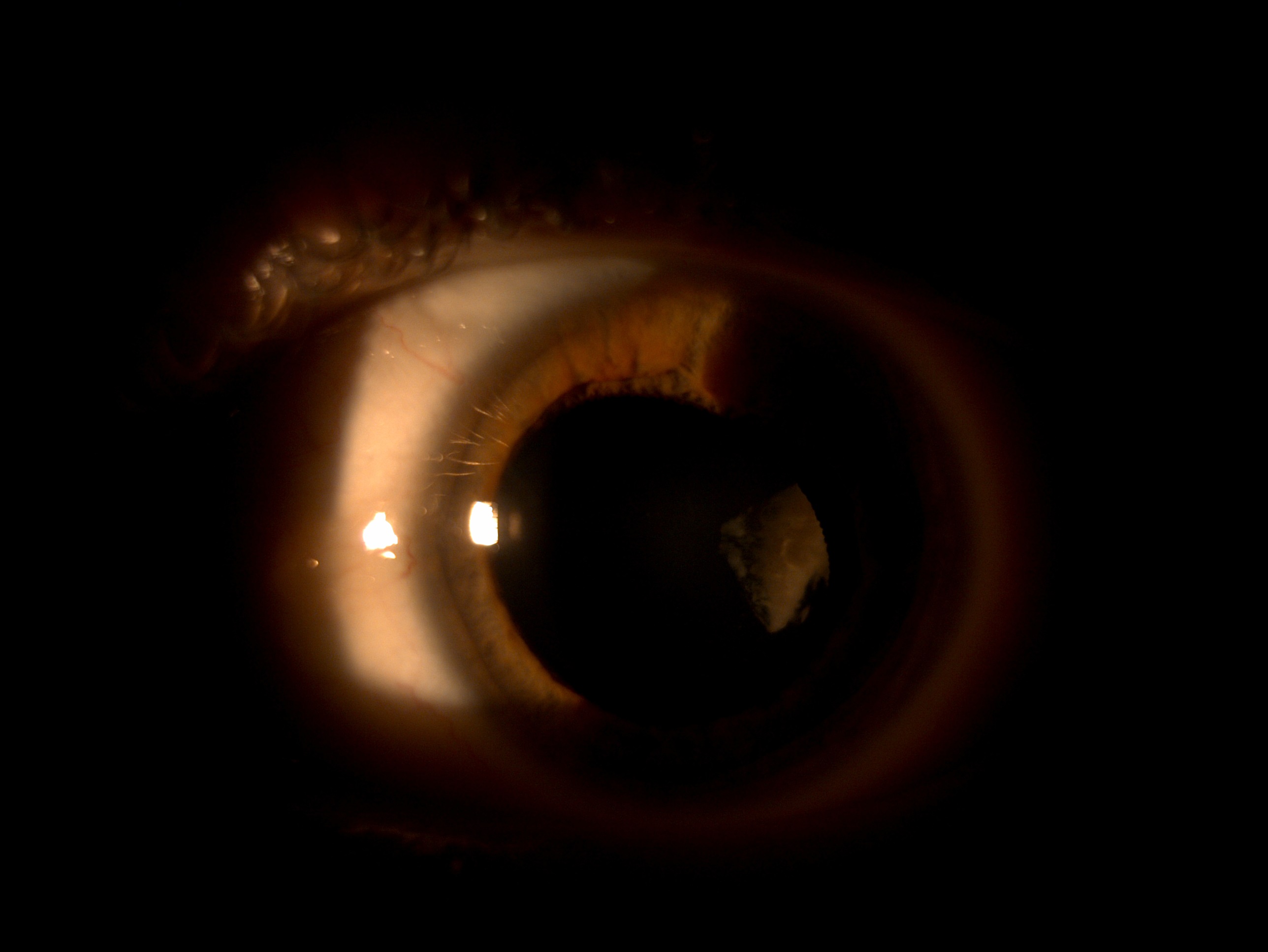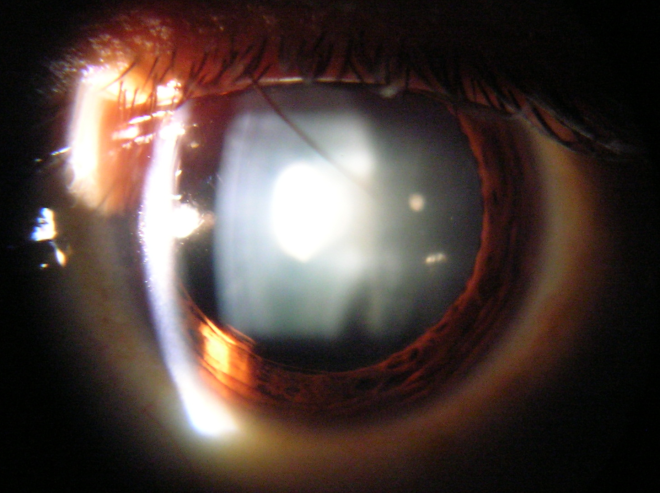So today I had my two-year eye exam. You know: you go in ever two years to have your eyes checked and your eyeglass prescription updated.
About 8 years ago I learned that I have a benign cataract in my left eye, located just to the outside of my pupil. My doctor back then told me it’s benign, it doesn’t grow, it just sits there a casts a shadow. However, it’s not visible to me, and it will never affect my eye sight. She surmised I was born with it : it may be due to my premature birth (I was 3 1/2 months early) and have likely had it my entire life. Every two years since, I’d been told by the next doctor that I had a benign cataract on my left eye, and that it was just sitting there, doing nothing.
Two years ago, I went in for my usual eye exam and the presence of my benign cataract was confirmed, yet again. There was no mention of any other formation of any other cataracts, or of any growth of the oldy-but-a-goody. Life was good.
I’ve become accustomed to going in every 2 years only to be told I need a slightly stronger prescription. They all blamed it on the fact that I sit at a computer all day and it just wears on your eyesight. So wasn’t expecting anything different this time. Yeah, my night vision has recently been getting blurrier and blurrier, the headlights and stop lights and brake lights casting more of a halo and glare than usual. It’s been getting harder and harder to read the reflective road signs as they balloon out of proportion. Squinting more and moving closer and closer to the computer screen, embraced by it’s glow.
But today…today was different. My doctor discovered the existence of a new, a second, cataract in my left eye. One that IS affecting my vision. One that has severely increased my prescription…and will continue to do so. One that wasn’t there two years ago.
Her first question, “Have you been taking Prednisone?” Um, what? “No, but I’m now on birth control.” Her retort was a simple nod of the head and a, “Mm-hmmm.” I also let her know I had been on Lupron for six months, but she had no idea what that was. I explained it shuts down your body’s estrogen production and casts you into chemical menopause. Another thoughtful, “hmmm” escaped her lips.
Which caused me to go “hmmmm” and hit the books.
I am now at 20/30 vision. She says once I hit 20/40 vision, I will be recommended for cataract surgery. I’m sorry, what? Cataract surgery? I’m 36! I kind of squealed at her, “Aren’t I supposed to get these when I’m old and like 80?!?” She agreed, but said sometimes these things develop.
**UPDATED October 10, 2017** I went to the eye doctor in August 2017 since my vision has been getting blurrier AND I was seeing double…the cataract has doubled in size, and my vision was 20/50. I was referred to an ophthalmologist and had cataract surgery on October 2, 2017. My left eye vision is now 20/10!! AND (surprise!!!!) I also had a cataract on my RIGHT eye, which was surgically repaired on November 6, 2017. Both my optometrist and ophthalmologist agreed it was likely my premature birth combined with the Lupron Depot that caused my early development of cataracts.



What is a cataract?
Cataracts are a clouding of the lens of the eyeball. It causes blurred vision and even blindness. It occurs in older adults and more than half of Americans over the age of 80 will have cataracts or have had cataract surgery. Many people begin to develop small cataracts in their 40s or 50s, but they do not become a problem for their vision until their 60s.
If you wear glasses and have a smudge on the lens, your vision through that lens is blurred . If you’re a photographer and likewise have a smudge on your lens, the photograph or image may be blurry or smudged. Your lens of your eyeball works the same way; if there’s a cataract, your vision will appear blurred.
Cataracts may develop slowly over years, or be accelerated by many factors. They may even develop over a few short months. But what causes cataracts? Could be Diabetes, could be smoking or drinking alcohol, could be sun exposure, could be diet, or it could be drugs. It can even just be hereditary. It could be. However, other factors may come into play.
ADT and Cataracts?
ADT, also known as Androgen Deprivation Therapy is a hormone therapy used to treat prostate cancer. Prostate cancer cells are fed by male hormones, especially testosterone, and ADT is meant to reduce those hormone levels. The reduction of those levels slows or shrinks the growth of the prostate cancer cells.
One such drug used for Androgen Deprivation Therapy is leuprolide, aka Lupron. The same Lupron that is used to treat Endometriosis in women. And we share similar side effects : lack of libido, hot flashes, nigh sweats, increase or decrease of chest size (moobs & boobs), fatigue, bone loss, depression, etc. Not an easy ride for either sex.
In 2007, Medical Principle and Practice published a study of a 52-year-old man who had developed a cataract in his right eye only 4 weeks after his ADT injection of Zoladex (which is also a GnRH that is used to treat Endometriosis).
In 2010, Fox News reported that prostate cancer treatments using ADT’s side effects such as weight gain, dyslipidemia, and insulin resistance may increase a man’s risk of developing cataracts. In October 2010, the FDA pushed for stricter warnings on ADT drugs regarding the risks of developing heart disease or Diabetes. It appears due to the increased risk of developing Diabetes or obesity because of ADT, cataracts may also develop. A study of 66,000 cancer patients occurred and half of them had received some sort of hormone therapy during the first six months of their cancer treatment. Six months (sound familiar for you Lupron EndoSisters?). For every 1,000 men, 111 new cataracts were diagnosed. The authors of the study estimate that 5% of the cataract cases may be attributed to their Androgen Deprivation Therapy. The study actually concluded that, “Gonadotropin-releasing hormone agonist use was associated with a modest increase in cataract incidence…Further study, preferably prospective in design, is needed to provide additional evidence to support or refute these findings.” Gonadotropin-releasing hormone agonist? It’s also known as GnRH…which is what Lupron is…
Lupron and Cataracts?
Hands Off Our Ovaries has published (in .doc format) testimonials of women who have taken Lupron, and shared their horrific side effects and personal stories. One woman, Wendy, was diagnosed with cataracts at the age of 38 after taking Lupron to help with her IVF treatments. Her eye doctor asked if she ever took fertility drugs, and that she was only “one of many” who had since developed cataracts. These were heard, among other topics, before the Subcommittee on Science, Technology, and Space of the United States Senate 108th Congress in 2003.
Unfortunately, I cannot locate any studies or evidence specifically tying together (or even suspecting) Lupron Depot treatments (or any GnRH for that matter), women, and cataracts. They just don’t exist. Almost as if nobody has asked. They’re looking into it with men…but not women. Well, not yet.
Other Drugs and Cataracts?
NSAIDs (Naproxen, Ibuprofen) may also put you at a higher risk of developing cataracts. The folks at Natural Eye Care believe, “NSAIDS (ie, aspirin, ibuprofin, advil, meclofen) are photosensitizing drugs (drugs that increase your sensitivity to the sun) that absorb light energy and undergo a photochemical reaction resulting in chemical modification of tissue. They can make you more susceptible to cataracts and macular degeneration” and “many birth control pills have make you more sensitivity to sunlight and can result in chemical modification of tissue. They can make you more susceptible to cataracts and macular degeneration.”
As usual, there’s a flip-side to these blogs, and today is no different. NSAIDs are also the leading drug used to address discomfort and inflammation in patients who have just undergone a cataract surgery. It may also help prevent post-operative complications and edemas.
Cataract Surgery
Surgery is the only effective way of dealing with cataracts. The clouded lens is removed, and a clear implant is put in its place. *Voila* clear vision is restored. It’s usually an out-patient procedure, and may only take a few days to fully recover. And 90% of people who undergo cataract surgery in the U.S. have success rate and recoup their clear vision.
Advances in Cataract Surgeries and Permanent Treatments
The National Eye Institute has ongoing studies and research efforts for best how to prevent and treat cataracts.
There are also constantly new and better ways to have cataract surgery. Like all other realms of medicine, it’s advancing : there are new types and materials of of lens implants and now there are laser procedures (rather than scalpel).
A Canadian physician, Dr. Garth Webb, has even created the “Ocumetic Bionic Lens,” which would replace your natural lenses with bionic ones, promising perfect vision. The surgical procedure is similar to cataract surgery; however, clinical animal trials are still pending and it could be two years or longer before the Bionic Lens is available in Canada. For more information on Dr. Webb’s invention, or to help people around the world regain their eyesight, he’s developed a foundation, Celebration of Sight.
PS –
I know better than to blame every little thing on my condition, my medications, and my medical decisions. So perhaps the cataract did form purely because I’m getting older. Maybe that’s true. But maybe, just maybe, my body reacted to the medication that I put into it (years of Naproxen, Midol, and Ibuprofen; six months of Lupron; and now birth control pills), and maybe I am not alone in this journey. Maybe there are other men and women who have developed cataracts after using Lupron Depot, birth control, ADT, or GnRHs. If it’s a possibility, then it’s a something that needs to be further addressed and researched by our great and talented medical and scientific community.
Do you have any thoughts?
I would love to hear them. Please. For the first time in several months, I’m scared again (even though I know I won’t know didley-poop for the next two or more years).
*Updated December 30, 2020*
Resources:
Cancer.Org : ADT
CT News : B.C. Doctor Says Perfect Vision Possible with Bionic Lens
EyeDocNews : Are Cataracts a Side Effect of Prostate Cancer Therapy Designed to Suppress Testosterone?
Fifth Avenue Eye Care and Surgery
Fox News : Prostate Cancer Treatment May be Tied to Cataracts
Fox News : New Cataract Surgery Eliminates Need for Glasses
Hands Off Our Ovaries
Medical Principles and Practice (2007: Article) Luteinizing Hormone-Releasing Hormone Analogue-Induced Cataract in a Patient with Prostate Cancer
National Institute of Health, National Eye Institute
University of Rochester Medical Center
U.S. Government Publishing Office : (2013) Cloning: A Risk For Women? Hearing before the Subcommittee on Science, Technology and Space of the Committee on Commerce, Science, and Transportation, United States Senate, 108th Congress
Annals of Epidemiology: (2010, Abstract) Androgen Deprivation Therapy and Cataract Incidence Among Elderly Prostate Cancer Patients in the United States
U.S. Food & Drug Administration : FDA Drug Safety Communication: Update to Ongoing Safety Review of GnRH Agonists and Notification to Manufacturers of GnRH Agonists to Add New Safety Information on Labeling Regarding Increased Risk of Diabetes and Certain Cardiovascular Diseases
~ Again, I am a layman. I do not hold any college degrees, nor mastery of knowledge. Please take what I say with a grain of salt. If curious, do your own research 😉 Validate my writings. Or challenge them. And ALWAYS feel free to consult with your physician. Always. Yours ~ Lisa




Usually cataract surgery goes very well. Perhaps you can have cataract surgery and stay on the hormones to control the endo. Sorry you’re having cataracts at such an “early” age. BUT I know many patients who are very pleased with their cataract surgery, my father included, who no longer need to wear glasses … no retinal detachment is a WHOLE other serious horror story! Better to have cataracts, generally speaking, than retinal detachment!!!!!!! FOR SURE!
LikeLiked by 1 person
Reblogged this on Bloomin' Uterus and commented:
So in 2015 I was told I had developed a cataract, and my doctor thought it may have been due to my BC or Lupron Depot. In 2016, I went for another check-up, the cataract had grown a little bit, but it wasn’t bad enough for surgery. Yesterday, my doctor confirmed that my cataract has doubled in size (thus causing the blurry and double-vision I’ve been experiencing) and referred me to an ophthalmologist to discuss cataract surgery. Again, he stated that he believed it was due to my Lupron Depot. In 2015, I did research on Lupron and cataracts. Did you know it may increase your chances of developing a cataract? Perhaps it simply developed as a fact of life…but t the timing of it all (just a few months after my last Lupron Depot injection) makes me think otherwise…
LikeLike
Hi
How are you now? I hope the endo is still under control.
I have just (at age 46) been picked up with early stage cataracts, have endo stage 4 and adenomyosis, c, 25 years of birth control and started Zoladex (similar to Lupron), have had 2 injections so far.
It would be good if we good gather any anecdotal evidence in ladies regarding contracts/Zoladex. My main concern is whether staying on the Zoladex will increase the rate at which the cataracts progress.
LikeLike
Hi Maria! I had the 2 cataract surgeries last year and don’t regret it one bit. I’ll be wearing reading glasses for the rest of my life for all that up-close stuff, but other than that it’s great. Certainly glad I did it. My Endo has it’s good days and it’s bad days…Although I wish, once more, that these possible side effects were clearly discussed with patients prior to administration of the drugs. I hadn’t heard at allll the increased potential of cataracts with these types of treatments.
Endo & Ado…ugh. You have my sympathies!!
Some studies have shown that some people on Zoladex have an increased risk of cataracts, especially if taking the drug for more than a year. You may want to talk to your doctors. Here are some links. https://www.ncbi.nlm.nih.gov/pmc/articles/PMC3792579/ and https://www.ehealthme.com/ds/zoladex/cataract/
Good luck!
LikeLike